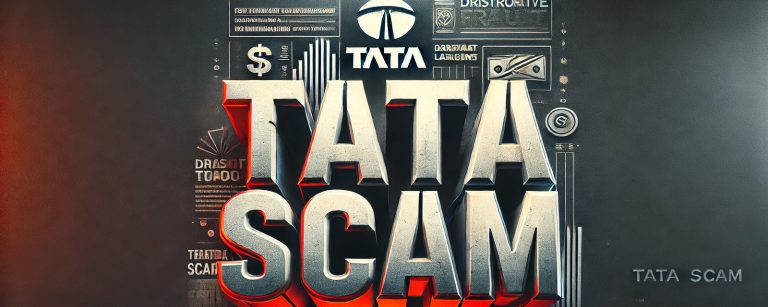The Tata Group- the gold standard in corporate ethics- was widely respected thanks to its seminal contribution to the nation’s industry and economic growth. All the same, controversies have always tended to surface there where questions may be raised on how the group should govern and/or operate. Although there has never been a “Tata scam” in the classical sense of outright fraud, enough has happened – ranging from allegations to disputes, which include Cyrus Mistry’s ousting, controversy over the Singur Nano project, and loss on the acquisition of Corus Steel – to tarnish this otherwise clean entity. This article will go into these controversies in detail, explore how the group responded, and analyze what lies ahead for one of India’s most iconic conglomerates.
Why is Tata Scam so Hot in the News?
The term Tata scam springs up whenever major controversies of Tata Group comes to the fore. It was one of the most well-televised litigations concerning the ouster of Cyrus Mistry as chairman of Tata Sons in 2016, pulling out years of bitter legal battles. It brings governance lapses, conflicts of interest, and decision-making processes at the very top of the Tata Group to the forefront.
Mismanagement perception has added major controversies of tata group over Singur Nano over land acquisition disputes and losses incurred from Corus Steel. Thus, the Tata Group remains in the public eye where debates on corporate governance, transparency, and ethics are held continuously. With all these, the group has weathered such storms mainly, and its legacy has been questioned many times.
In cases such as these, it is depicted that even the most reliable of organizations can encounter ethical and operational problems in today’s fast-paced times of changing business environments.
What Was the Tata Scam?
Tata scam is not one single act of fraud but rather an accumulation of major controversies of Tata Group; dealing with the controversy surrounding the management controversy, ethics, and governance controversy. These would include the Cyrus Mistry ouster, the Nano land acquisition controversy, and the financial scandal regarding the acquisition of Corus Steel.
The Cyrus Mistry Ouster
In 2016, the Tata Sons board suddenly stripped Cyrus Mistry of his chairmanship, raising governance lapses. Mistry, who took over from Ratan Tata in 2012, accused the group of unethical practices and poor decision-making. Mistry alleged that the Tata Group had made unviable investments, including the Nano project, which he described as a loss-making venture.
He was the first to speak against the stranglehold of Tata Trusts, which owned a major share in Tata Sons and was under attack for excessive interference in managing the house. The juridical battle unsealed some dark secrets about the group. Accusations and counter-accusations on governance and accountability issues took center stage. The Supreme Court in India had ruled in favor of Tata Sons to nullify Mistry’s removal as chairman in 2021. This scandal unveiled the difficulties in the quest for corporate governance to find the proper balance between tradition and modernity.
Nano Project Land Acquisition Row
The Nano project was one of Tata’s most ambitious ventures undertaken to produce the world’s cheapest car. The Nano project also had its cloud of controversy: the land acquisition row at Singur in West Bengal. Farmers said they were being dispossessed of their lands without proper compensation. The issue quickly became a political one, and protests and litigation stalled the project. In 2008, Tata Group decided to take the Nano plant to Gujarat. That state government was very agreeable to giving incentives and land without much opposition from activists.
Except for relocation, controversy clouded the Nano launch and could not make any impact in the market. Singur case also brings out the issues of ethics regarding land acquisition and engagement of business with meaningful interaction with affected communities.
Corus Steel Acquisition and Financial Losses
Tata Steel acquired Corus Group, a European steel manufacturer, for $12 billion in 2007. It was bold at first but later turned out to be a financial burden. It was a sharp contraction in steel demand worldwide, triggered by the 2008 global financial crisis, which made the purchase not viable. Some said that Tata Steel had overpaid for Corus, while due diligence had been weak during the period leading to the acquisition. Tata Steel’s losses stretched group finances, and the management’s strategic decision was questioned. The case of Corus acquisition remains one of the riskiest cross-border acquisitions, particularly for emerging market companies. Though these were not outright scams, they exposed vulnerabilities in the decision-making and operating practices of the group.
How Did the Tata Group Handle the Allegations?
The Tata Group has rejected all the malpractice allegations. Instead, they have demonstrated ethics and integrity. The group has handled controversies by defending the implemented decisions, along with answering the issues raised concerning the controversies.
Cyrus Mistry Removed
According to the group, the removal of Mistry was for its long-term interest. Tata Sons insisted that the style of leadership and strategic decisions taken by Mistry did not belong to the group’s value system. There was a case in the legal battle, but the verdict given by the Supreme Court in favor of Tata Sons proved to be a legitimization for the group’s stand.
Nano Project
Tata Group shifted the Nano project to Gujarat in response to the Singur protest. This would avoid unfavorable repercussions of the protest on the project. But sales did not reactivate. The car has been phased out.
Corus Losses
Tata Steel restructured its business by selling loss-incurring assets and initiating cost-cutting measures. It acquired lessons in managing cross-border acquisitions and global markets from all these transactions. In all such cases, the Tata Group continued showing commitment to ethical practices and worked on regaining public trust.
What Way Ahead for the Tata Group?
Tata Group controversies are lessons for businesses where governance, transparency, and stakeholder engagement must be promoted. Shortly, the group concentrated on reforms and improving its operational framework. Steps Taken by the Tata Group
- Improving Governance: Board oversight has been strengthened with measures that ensure the decisions’ independence. The independent directors have been appointed, and the group implemented global best practices.
- Ethics: Tata Trusts and Tata Sons have pledged towards ethical practices, and the same has been initiated in training along with the mechanism of compliance so that there is transparency.
- Diversification and Innovation: The company is venturing into green energy, e-commerce, new-age business, and digital platform Tata Neu for long-term sustenance.
It aligns with the ESG standards and adopts responsible and sustainable business practices. These steps indicate the intent of the group to continue their legacy but also adapt to the changing market dynamics.
Tata Scam FAQs
1. What is a Tata scam?
Tata scam includes controversies like Cyrus Mistry ouster, Singur Nano project, and financial loss mainly through the acquisition of Corus Steel.
2. Why was Cyrus Mistry removed as Tata Sons chairman?
Cyrus Mistry was removed in 2016 based on governance issues, strategic decisions that were misaligned, and conflicts with the Tata Trusts, which own a majority of the shares in Tata Sons.
3. What finally happened to Tata Nano projects?
The Tata Nano projects were so much criticized by the media for land acquisition in Singur, West Bengal. Even though the company shifted the plant to Gujarat, Nano still had much hassle in the market. Finally, it had to be stopped.
4. How did Tata Group handle all these controversies?
Tata Group shifted the Nano plant, reorganized operations post-Corus acquisition, and implemented governance reforms. It continues to stick to ethics and integrity.
5. What can businesses learn from Tata controversies?
Governance, stakeholder communication, ethical practices, and due diligence need to be included in the decision-making process in businesses to avoid controversy and build trust.


